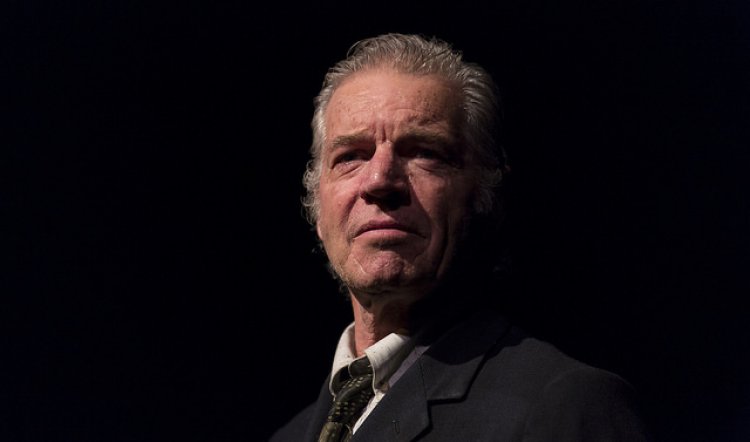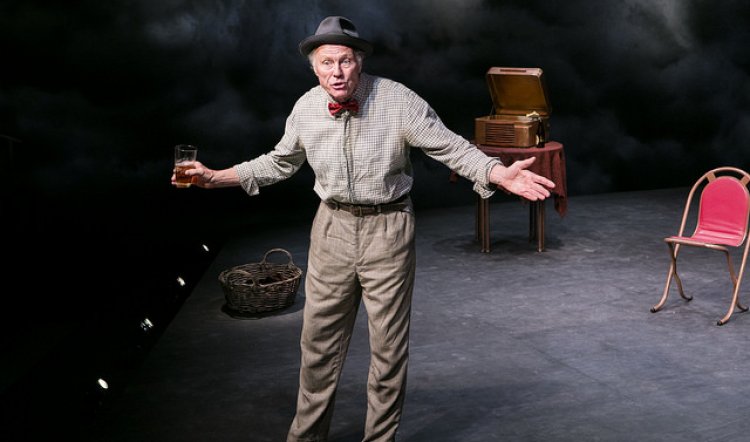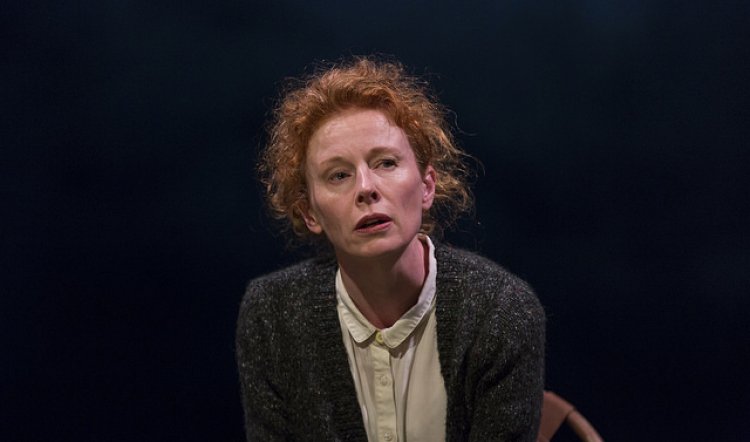
FAITH HEALER
FAITH HEALER, Upstairs Belvoir, 26 October-22 November 2016. Photography by Brett Boardman, above – Colin Friels, below – Pip Miller, then Alison Whyte
At the top of her director’s notes, Judy Davis quotes actor Stephen Rea on Brian Friel: “It’s all about language, he said to me. The play, I asked? The theatre? The whole thing, he said.” It could not better describe this play, and this production.
The plays of Brian Friel for long enjoyed early recognition on Broadway, from his first major success, Philadelphia, Here I Come (world premiere in Dublin, 1964) which opened in New York in 1966. However, Faith Healer was not initially one of his US winners.
Written in 1979, its Broadway world premiere was a misbegotten production starring James Mason, his wife Clarissa Kaye and Donal Donelly. Directed by José Quintero who walked rather than continue to work with the Masons, it closed after 17 performances. Happily, since then, Faith Healer has come to be appreciated as one of the playwright’s greatest works, not least after its first London season at the Royal Court (1981) that featured a lank-haired Helen Mirren as the faith healer’s wife.
In Belvoir’s production, Alison Whyte – all Celtic luminescence and deceptive fragility – is Grace, the young woman who defies class and reason to marry the “Fantastic Francis Hardy” (Colin Friels). In an unusual structure of lengthy monologues, hers is the second after her roguish husband has already convinced us of his story and she is mesmerising.
Grace has a very different version of their lives, but such is the inevitable capriciousness of recollection and so persuasive the con man’s yarn, doubt remains for much of the hour and 50 minutes of glorious story-telling that is Faith Healer.

The third element of this fabulist’s life is his manager, the East End wide boy Teddy (Pip Miller) whose previous headline act had been a misogynist bagpipe-playing whippet. And, of course, his remembrance of the trio’s life on the back roads of Scotland and Wales is markedly different again.
Faith Healer opens in darkness with a weird incantation rising out of the gloom. It’s Frank and rather than something in ancient Sanskrit, it turns out to be his meditation on where they’ve been and his way of coping with what it all meant: “Kinlochbervie, Inverbervie, Inverdruie, Invergordon, Badachroo, Kinlochewe, Ballantrae, Inverkeithing, Cawdor, Kirkconnell, Plaidy, Kirkinner...”
It’s a daring act of writing – both poetic and discomfiting – and a challenge for an actor. The audience instantly thinks this man is a dangerous nutter and then he has to win us over – quickly and permanently, despite all further revelations. Casting Colin Friels in the role makes all that seem simple. In person he is effortlessly charming and that charm (and his skill as an actor) are the keys and eventually the weapon used against him. Frank might be loveable but he’s also a damaged and damaging man.
And then as if that unsettling charisma were not enough, his manager Teddy turns out to be genuinely appealing. Pip Miller is early Michael Caine out of George Cole with glottal stops and greasy snap brim fedora to complete the seedy portrait. Despite what has been revealed by Grace and Frank – or what might have been revealed or obfuscated, who knows – when Teddy tells the story there is laughter. And the possibility of Frank healing ten hapless Welsh villagers seems crazily credible.
Friels, Whyte and Miller give beautifully pitched and finely nuanced performances. As she flags in her notes (see above) Judy Davis trusts and honours the text and the result is an experience to be savoured. The three storytellers are enthralling and the engaging quality of their disparate world view is remarkable – because of the alchemy that is the playwright’s ability to transform ordinary into extraordinary.

Brian Thomson and Verity Hampson (set and lighting design) collaborate again (see The Turquoise Elephant/Griffin) in creating a place where the imagination and emotions are free to visualise the bleakness and beauty described by Frank, Grace and Teddy.
This evocative simplicity is further heightened by Tess Schofield’s costumes. Frank’s grubby, ill-fitting suit and op-shop overcoat are a sad clue to his once hopeful life, Teddy is slightly more dapper but can’t see the grimy give-away of his back pockets. Only Grace keeps her outdated style intact which in itself is tragic as becomes apparent. Rarely can three outfits have given so much narrative information – some of which can almost be smelled from across the footlights.
We’ve become accustomed to modern Irish writing, mainly through the work of Martin McDonagh (most recently The Beauty Queen of Leenane, The Cripple of Inishmaan, The Lieutenant of Inishmore) and it’s revelatory to hear how he is so clearly the descendant of Brian Friel – who died late last year.
Faith Healer makes it two in a row for Belvoir after the magnificent The Drover’s Wife. Everything is right with this production – don’t miss it.
Comments
Leave a Comment
Enter your username and password to comment. Don't have a username? Register now.




Be the first to leave a comment below